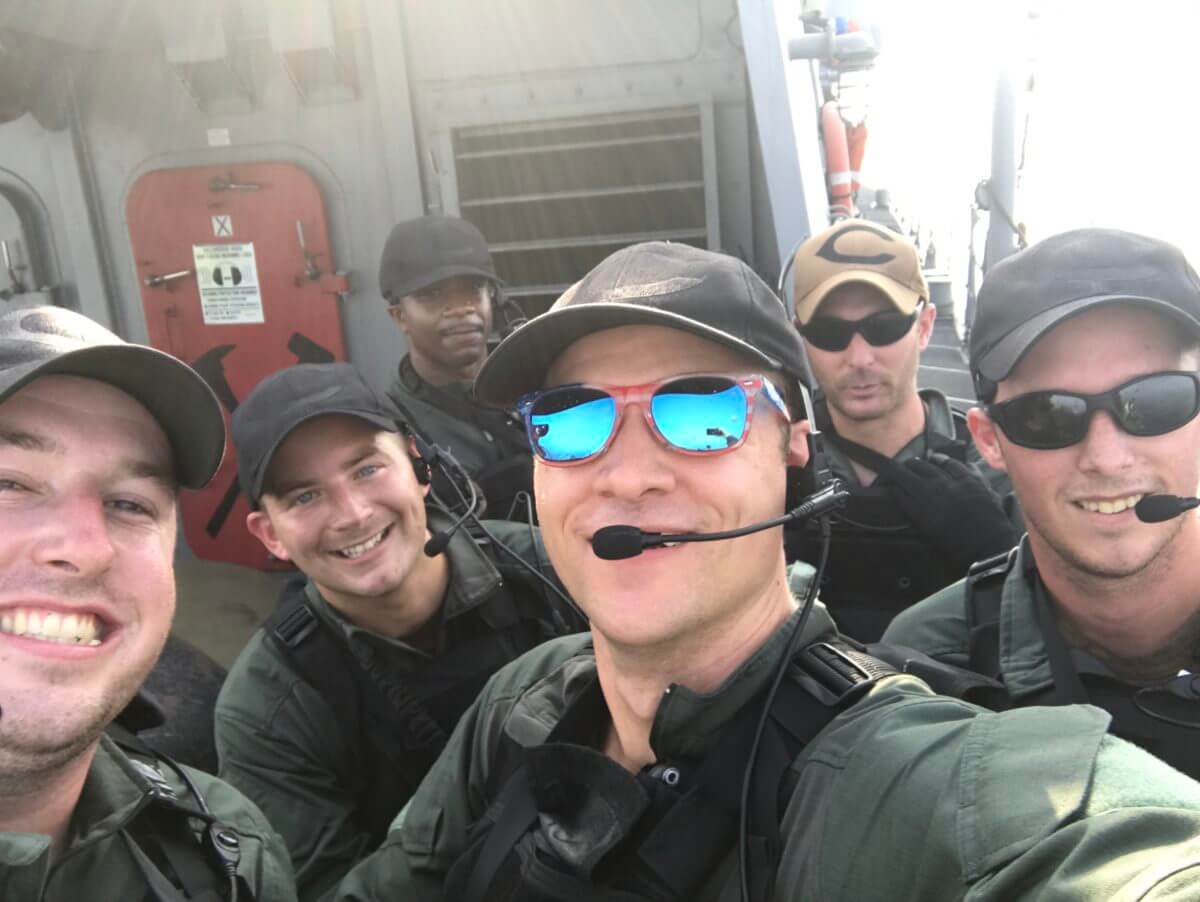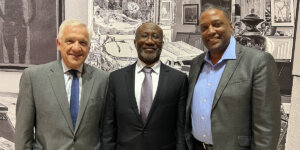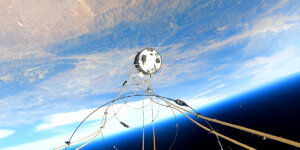
Executive Officer Jonathan Yoke (center), now a grad student in astronautical engineering, with the sailors aboard their PC boat patrolling the waters of the Persian Gulf. Photo courtesy of Jonathan Yoke
Not long ago, Executive Officer Jonathan Yoke was patrolling the coastal waters of Bahrain, once home to the Dilmun civilization, an important Bronze Age trade center linking Mesopotamia and the Indus Valley. Aboard his Patrol Coastal vessel, the Navy’s smallest yet most well-equipped ships, he had a great vantage point to ponder the vestiges of kingdoms that came and went with the sands of time. His eyes, however, were set on the Red Planet and on humanity’s next great voyage. How was he going to get there? We sat down with Yoke, now a master’s student in the Department of Astronautical Engineering at USC Viterbi and discussed his bold plans to be one of the first to set foot on Martian soil.
You’ve worked as a Navy Officer, professional actor, and managed IT support for brain-computer interfaces. All of this has been a preparation for what in life?
Until I was about 20, I had intended to get a Ph.D. in biomedical engineering to study brain-computer interfaces (BCIs). My interests gradually shifted in my early 20s – about a decade ago. I realized that it is incredibly important for us to become multi-planetary and begin human exploration of the rest of the solar system. It took me a few years to shift gears, during which time I worked in a BCI lab doing IT. I actually joined the Navy to be a pilot, but that didn’t work out due to my eyesight. The day before graduation from Officer Candidate School, I was presented with a choice: go SWO or go home. Although I knew that it was a bit of a detour from my intended path, I chose to commission as a Surface Warfare Officer and served on surface ships for four years.
As far as being a “professional actor,” this was a bucket list item. During my undergraduate at UVA, I did several theatre productions – mostly Shakespeare – and I absolutely loved it. I even briefly considered trying to make a career of acting. Although I chose a different path, my concession to myself was that at some point I would get a job being paid to act. When I performed for a season with the Maryland Renaissance Festival for a very modest stipend, I checked that one off my list.
While much of what I’ve done will eventually contribute to my goal of helping humanity colonize Mars, it isn’t until pretty recently that I’ve become laser-focused on this.
What is your mission now as a student and what do you envision yourself doing post-graduation?
Right now, my mission is to learn as much as possible and graduate! That said, it’s amazing to be back in school finally pursuing on a daily basis what I’ve been thinking about for years. I’m really enjoying my classes and my work at the USC Liquid Propulsion Laboratory (LPL). Another big bonus is that I get to study and work with like-minded people with similar interests for the first time in many years.
Post-graduation, I intend to get a job at a fast-paced, results-oriented institution that contributes directly to human space exploration and colonization. Also, I haven’t completely ruled out a Ph.D. program. And as soon as applications for Mars colonists open up, I’m in!
You were stationed in Bahrain as an officer on a Patrol Coastal – the smallest ship in the Navy leading about 40 sailors on board. How is that different than being on a big carrier?
The biggest difference is simply the number of bodies on board. The differences a crew of 28 makes vs. a crew of 300 on a DDG (guided missile destroyer) is huge. Every single person is incredibly important in some way. In the military, we try hard to avoid single points of failure, both among personnel and equipment, but on a PC it’s unavoidable. We had just one medic, one cook, one search and rescue swimmer, one radar technician, etc. If any of them went down, the mission was over. The upside to this is that the crew gets very close to one another and forms a brotherhood in a way that I did not experience on my first ship (a cruiser).
Do you think humanity is ready to leave low-earth orbit and, if yes, what makes you confident?
Technologically we’ve been, by definition, ready since December 21, 1968 when Apollo 8 launched… and left low-earth orbit. That said, we haven’t had the political and societal will to leave Earth again until relatively recently. The space exploration renaissance is here.
There is an inherent risk involved in any exploratory mission, or really doing anything at all. The purpose of mission planning is to reduce that risk to a reasonable level. We did this sort of thing for every mission and evolution we did in the Navy. The problem arises in the definition of “reasonable level.” The risks involved with missions beyond LEO and specifically to Mars have been reviewed and reviewed and reviewed by countless people and organizations. The time to go has come.
Departing planet Earth and stepping into the unknown isn’t about technological problems, or risk, or more testing, or politics, or money, it is about the will to do it. Someone, or a group of someones has to decide “this is what we are going to do” and then make it happen. I think that has begun, and I intend to be a part of that group.
It’s a pretty big leap from hunting for pirates in the Persian Gulf to studying hypersonic flow dynamics in a lab on a college campus. What excites you the most about USC Viterbi, in general, and USC’s Liquid Propulsion Laboratory (LPL), specifically?
The master’s program in astronautical engineering here at USC is very well positioned. It’s a great program, so far, with interesting, informative classes and experienced professors who are good teachers. The focus is on teaching rather than research, and that really shines through when taking the classes. Additionally, it’s here in L.A., which has really been the heart of aerospace development for decades, despite what Houston, Huntsville, or Cape Canaveral might have to say. Finally, the DEN (USC Viterbi’s Distance Education Network) program allows students to move from full-time, in person to part-time, distance very easily. If I were offered a job today, I’d be able to accept it and still complete my degree.
Although I’m enjoying my classes, USC LPL is definitely the most exciting thing I’m doing at USC. When we fire our next engine, a 10 kN (kilonewton) regeneratively cooled, additively manufactured, kerolox (kerosene and liquid oxygen) engine, it will be the highest thrust engine developed and tested entirely by students. Right now, I’m working on the pyrotechnic igniters that we will use to light this engine.
How do you think the Navy and now USC has prepared you for a mission to Mars?
In the Navy, I learned prioritization, mission planning, working under tight deadlines, management, leadership, and how to deal with the red tape. At USC, I’m learning the hard skills and engineering chops to actually assist in the development of such a mission. I often hear people concerned about the human factors of a two- or three-year long mission to Mars, and my time in the Navy has given me some insight into this. Mainly, that if the mission is important enough, you can find a way to work with almost anyone.
Published on November 10th, 2018
Last updated on November 16th, 2018












